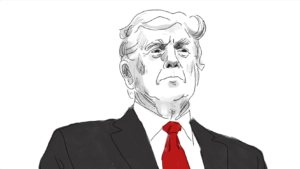Since being sworn in, newly-elected President Donald J. Trump has signed nearly two dozen executive actions. One of the most controversial of the directives signed by the President has been the executive order affecting immigration, which has triggered panic, anger and protests throughout the country. Trump further announced his Supreme Court nomination on Tuesday, two days earlier than anticipated. Trump also attended the National Prayer Breakfast, where both religious and political leaders were in attendance.
Trump’s so-called “immigration ban” has had far-reaching consequences. The order states that for 120 days, refugees will not be allowed to enter the United States. The bill also bans citizens from Iraq, Iran, Syria, Somalia, Sudan, Libya and Yemen from entering the United States, regardless of what type of visa they possess. Residents that live in the U.S. that have a green-card and plan on traveling will be dealt with on a case-to-case basis.
As a result of this ban, several green-card holders became stranded at airports last week, unable to enter the U.S even with pertinent paperwork.. From Jan. 27 to Jan. 29, numerous protests were organized at airports spanning from Boston to San Francisco. Using signs, chants and online posts the message to President Trump from protesters was very clear, “No hate, no fear, immigrants are welcome here.”
On Tuesday, Jan. 31, President Trump announced that he would be nominating Neil Gorsuch to fill the late Antonin Scalia’s seat on the Supreme Court. Gorsuch has been a federal appellate judge on the United States Court of Appeals for the Tenth Circuit since 2006.
Gorsuch holds a lengthy and rigorous academic record. He earned his undergraduate degree from Columbia University, his Juris Doctor (JD) from Harvard Law School and his doctorate from Oxford. He further clerked for Justices Byron White and Anthony Kennedy during their time on the Supreme Court.
Despite what Republicans argue are overwhelming qualifications for a position on the nation’s highest court, Democrats in the U.S. Senate are ready to put up a fight. Sen. Chuck Schumer, the Minority Leader of the Senate, has threatened to filibuster President Trump’s Supreme Court nominee. The Democrats are further irked that Mitch McConnell, the Senate Majority leader, refused to hold confirmation hearings for Merrick Garland, who was Barack Obama’s nominee to replace Justice Scalia in 2016.
Scalia, who died almost a year ago, was known for his conservative opinions and his strict constructionist views — advocating that the Constitution be followed and interpreted exactly how it was ratified over 200 years ago.
Earlier this week, Trump also attended the National Prayer Breakfast in Washington, where he asked lawmakers, religious leaders and foreign dignitaries to send a prayer to Arnold Schwarzenegger so that the ratings for his show “The Apprentice” would go up.
Schwarzenegger then took it to Twitter to respond, suggesting that him and Trump trade jobs. “You take over TV, because you’re such an expert in ratings, and I take over your job, and people can finally sleep comfortably again.”
The breakfast, which began in 1953, is meant to bring bipartisan political leaders and their religious matches together to pray and build relationships. President Trump also touched briefly on his beliefs that religious liberties should be supported, national security should be protected. While many of Trump’s supporters are pleased with his actions so far, fervent activists across the United States continue to protest the administration’s new direction.















